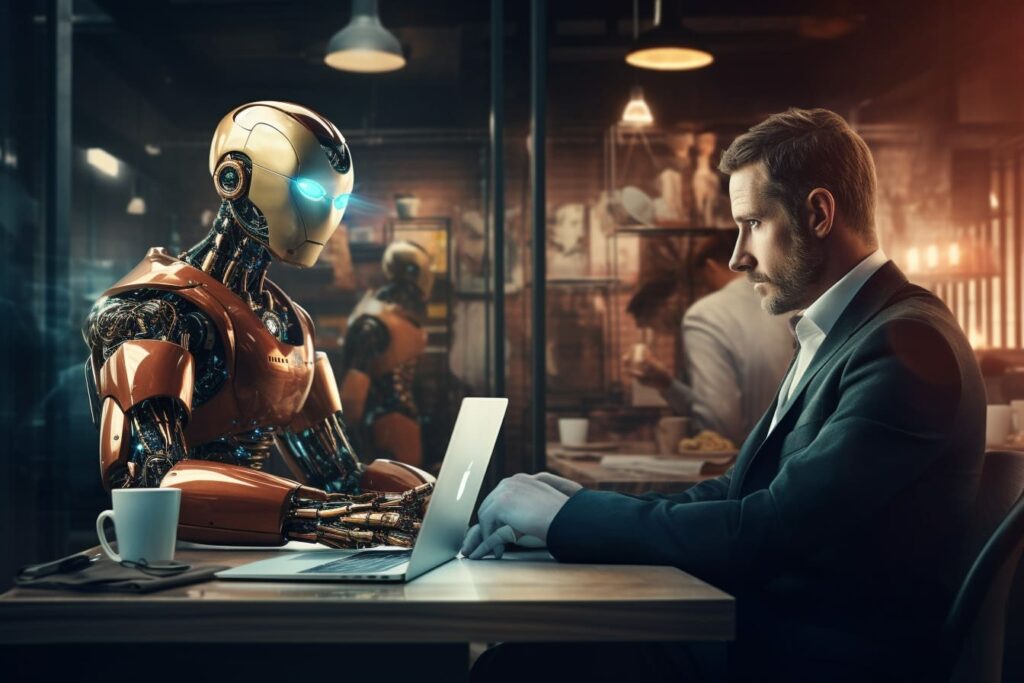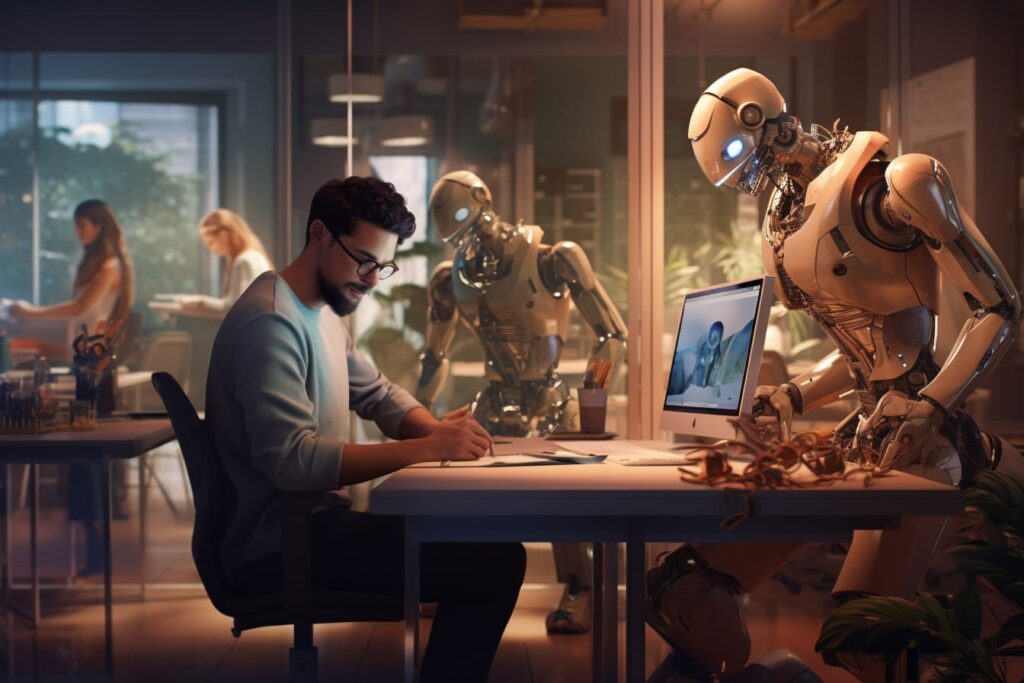Meet Your Newest (Non-Sentient) Co-Worker
Picture this: You walk into the office, still waking up, clutching your overpriced latte like a lifeline. You sit down, open your laptop, and realize… your AI assistant has already done half your work. Emails drafted. Reports generated. That mind-numbing spreadsheet you were avoiding? It’s color-coded and error-free.
It’s a dream—or maybe a slightly unsettling reality.
AI is no longer some futuristic fever dream of Silicon Valley tech bros. It’s here, and it’s working alongside us (whether we like it or not). Over 50% of companies have already adopted AI in some form, and by 2025, AI spending is expected to hit $200 billion. That’s a lot of money being thrown at technology that, frankly, is still trying to figure out the difference between sarcasm and sincerity.
But here’s the thing: AI isn’t coming to steal your job. It’s coming to steal parts of your job—the parts you secretly hated anyway. So, let’s talk about what this means for your workday, your skills, and whether or not you should start buttering up your new robotic overlords.
A Day in the Life of an AI-Powered Office
To understand AI’s impact, let’s break it down by how different industries are already using it. Spoiler: It’s doing more than just auto-generating meeting notes.
| Job Function | How AI Is Involved |
|---|---|
| Customer Service | AI chatbots handle routine questions, leaving humans to tackle the “I need to speak to a manager” moments. |
| Marketing & Copywriting | AI tools draft emails, ad copy, and even entire blog posts (though they can’t resist just one more buzzword). |
| Software Development | AI writes and debugs code, meaning programmers spend less time fixing typos and more time arguing about tabs vs. spaces. |
| Finance & Accounting | AI detects fraud, predicts market trends, and stops accountants from “accidentally” expensing luxury vacations. |
| HR & Recruiting | AI screens resumes, ensuring recruiters never have to read another cover letter that begins with “To whom it may concern…” |
The common theme? AI is taking over the boring, repetitive, soul-sucking tasks, leaving humans free to focus on strategy, creativity, and problem-solving—or, let’s be honest, spending more time debating whether that email really needs a smiley face.
From Co-Workers to Co-Pilots
There’s a big misconception that AI is replacing humans outright. In reality, it’s functioning more like a co-pilot, not a takeover artist.
For example:
- Coders now use AI to debug and suggest improvements. Instead of spending hours staring blankly at the screen, they let AI suggest fixes—most of which they’ll ignore, but hey, it’s the thought that counts.
- Writers use AI for brainstorming. AI generates ideas that are either brilliant, bizarre, or both (“Why not write a love story between a sentient toaster and a lonely programmer?”).
- Doctors use AI for diagnostics. AI spots patterns in medical scans that even experienced professionals might miss, but it still can’t tell you if that WebMD search is giving you an anxiety attack for no reason.
Instead of making humans obsolete, AI is pushing us to focus on what we do best—thinking critically, creating, and making judgment calls.

Your Most Valuable Skills in an AI-Powered World
If you’re wondering how to future-proof yourself in a world where AI is getting smarter by the second, here’s the good news: AI still lacks common sense, emotional intelligence, and the ability to truly innovate. That means certain human skills will always be in high demand:
🧠 Critical Thinking – AI generates information, but it can’t tell you if it’s nonsense. That’s where your ability to analyze and interpret comes in.
🎨 Creativity – AI can remix existing ideas, but it doesn’t truly innovate. It can paint a picture in the style of Van Gogh, but it won’t wake up one day and invent Cubism.
🫂 Emotional Intelligence – AI can analyze sentiment, but it doesn’t understand people. That’s why no chatbot has ever given good relationship advice.
⚡ Adaptability – AI is evolving fast. The best workers will be those who embrace new tech rather than clinging to the past (“Back in my day, we wrote emails by hand!”).
So, if your job relies on deep thinking, creativity, and human connection, you’re in a good spot. But if your job is 100% routine-based, well… maybe start leveling up those skills.
The Big Questions: Will AI Take Your Job?
The short answer: Maybe parts of it. The long answer: It depends on how you adapt.
Industries are shifting, and jobs are changing. Some positions will disappear (goodbye, data entry clerks), but new roles will emerge (hello, AI trainers, AI auditors, and prompt engineers!). The key is to embrace AI as a tool, not a threat.
Here’s a simple way to think about it:
- If your job is entirely predictable and repetitive, AI might take over.
- If your job requires judgment, creativity, and human interaction, AI is more likely to assist than replace.
- If your job involves yelling at computers when they don’t work, congrats—you’re safe.
Final Thoughts: Making Peace With Your AI Co-Worker
AI isn’t here to overthrow humanity (yet). It’s here to push us into new ways of thinking and working. It’s freeing us from the mundane so we can focus on big ideas, innovation, and, let’s be honest, slightly more interesting Slack conversations.
So, next time your AI assistant suggests a response to an email or drafts a report while you’re off getting coffee, don’t panic. Take a deep breath, tweak it to sound less robotic, and remember:
No matter how advanced AI gets, it still can’t take credit for your work at happy hour.
What do you think? Are we heading for a workplace revolution, or are we just giving ourselves a new kind of digital headache? Drop your thoughts—human or AI-generated, I won’t judge.
